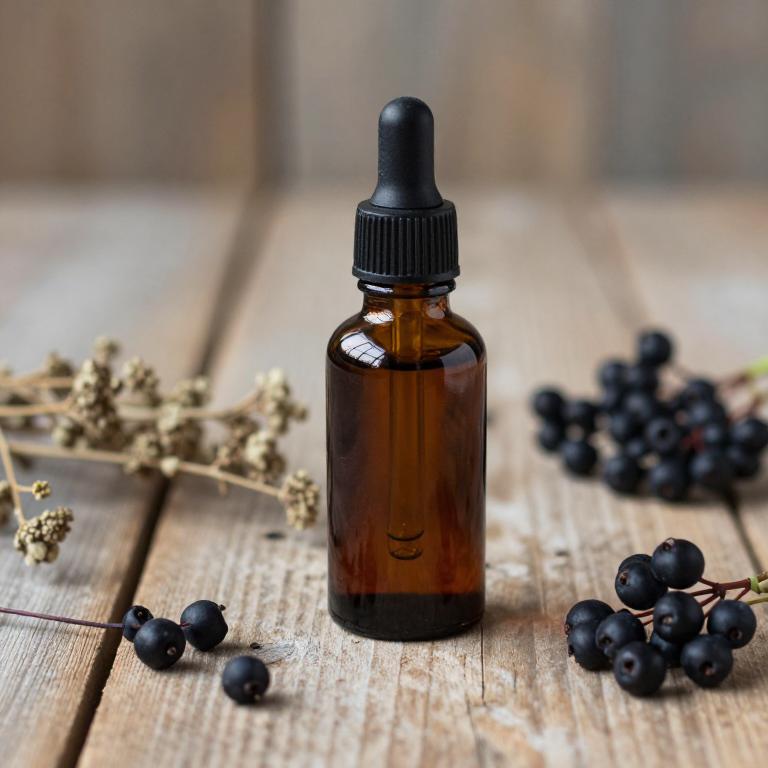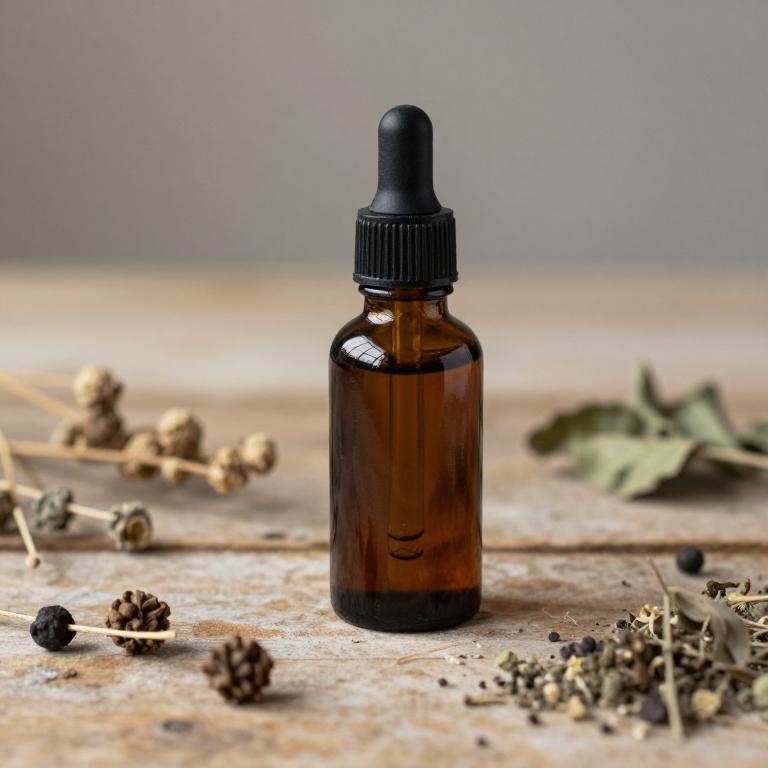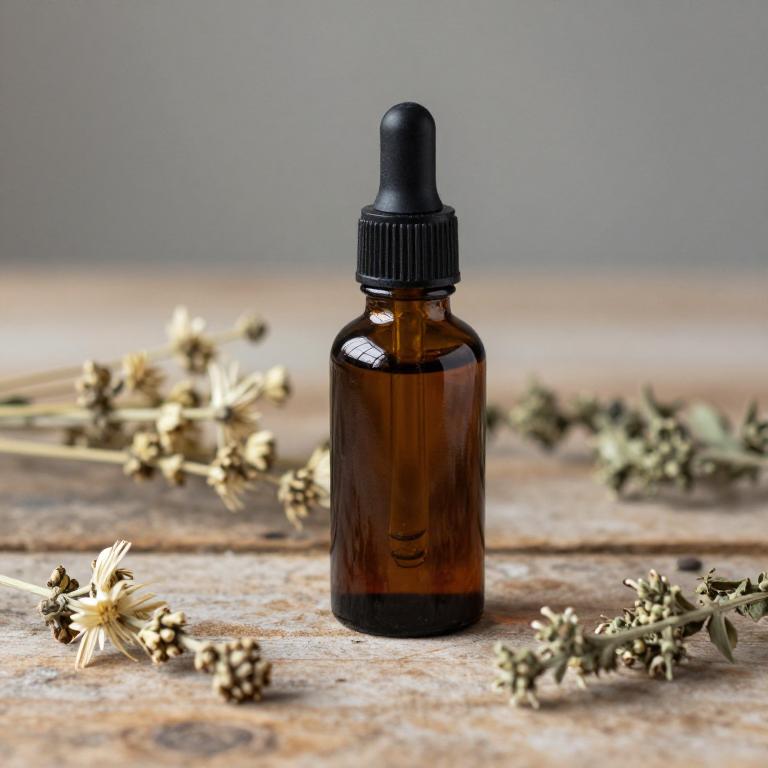10 Best Herbal Tinctures For Flu

Herbal tinctures for flu are concentrated liquid preparations made by steeping herbs in alcohol or vinegar, which extract their active compounds.
These tinctures are often used to alleviate flu symptoms such as fever, congestion, and body aches due to their antiviral, anti-inflammatory, and immune-boosting properties. Common herbs used in flu tinctures include echinacea, elderberry, garlic, and ginger, each offering unique therapeutic benefits. They are typically taken in small doses and can be a natural alternative or complement to conventional flu treatments.
However, it is important to consult a healthcare professional before using herbal tinctures, especially for individuals with allergies or those taking other medications.
Table of Contents
- 1. Echinacea (Echinacea purpurea)
- 2. Black elderberry (Sambucus nigra)
- 3. Ginger (Zingiber officinale)
- 4. Thyme (Thymus vulgaris)
- 5. Chaste tree (Vitex agnus-castus)
- 6. Ceylon cinnamon (Cinnamomum verum)
- 7. Stinging nettle (Urtica dioica)
- 8. Peppermint (Mentha piperita)
- 9. Rosemary (Rosmarinus officinalis)
- 10. Catnip (Nepeta cataria)
1. Echinacea (Echinacea purpurea)

Echinacea purpurea, commonly known as purple coneflower, is a popular herbal remedy used to support immune health and reduce the severity of flu symptoms.
Echinacea purpurea herbal tinctures are concentrated liquid extracts made from the plant’s flowers, leaves, and roots, often standardized to contain specific active compounds like alkamides and polysaccharides. These tinctures are believed to enhance the body’s immune response by stimulating white blood cell activity and reducing inflammation. Some studies suggest that echinacea may help shorten the duration of colds and flu when taken at the first sign of illness.
However, while generally considered safe for most adults, it is important to consult a healthcare provider before use, especially for individuals with allergies or those taking other medications.
2. Black elderberry (Sambucus nigra)

Sambucus nigra, commonly known as European elderberry, has been traditionally used for its potential immune-boosting properties, particularly in the treatment of flu symptoms.
Herbal tinctures made from the berries of the elder plant are often prepared using alcohol as a solvent to extract the active compounds, such as flavonoids and antioxidants. These tinctures are believed to support the body's natural defenses by reducing viral replication and inflammation, which may help alleviate symptoms like fever, sore throat, and congestion. Due to their high concentration of beneficial compounds, elderberry tinctures are typically taken in smaller doses compared to other herbal remedies.
However, it is important to consult a healthcare professional before using elderberry tinctures, especially for individuals with chronic conditions or those taking medications, to ensure safety and proper use.
3. Ginger (Zingiber officinale)

Zingiber officinale, commonly known as ginger, has been widely used in traditional medicine for its potent anti-inflammatory and antioxidant properties.
Ginger herbal tinctures, derived from the root of the plant, are often used to alleviate symptoms of the flu, such as fever, muscle pain, and nausea. These tinctures work by stimulating circulation and reducing oxidative stress in the body, which can help support the immune system during illness. The active compounds in ginger, such as gingerol and shogaol, are believed to have antiviral and antimicrobial effects that may inhibit the spread of flu viruses.
Incorporating ginger tinctures into a holistic flu treatment regimen can provide natural relief and complement conventional remedies for faster recovery.
4. Thyme (Thymus vulgaris)

Thymus vulgaris, commonly known as thyme, is a popular herb used in traditional medicine for its antimicrobial and immune-boosting properties.
Thymus vulgaris herbal tinctures are concentrated liquid extracts made by soaking the dried herb in alcohol, which helps preserve its active compounds. These tinctures are often used to support the immune system and alleviate symptoms of the flu, such as coughing and congestion. The essential oil of thyme, particularly thymol, is believed to have antiviral and antibacterial effects that may help combat viral infections.
While thyme tinctures can be a natural remedy for flu support, it is important to consult a healthcare professional before use, especially for individuals with allergies or chronic health conditions.
5. Chaste tree (Vitex agnus-castus)

Vitex agnus-castus, commonly known as chasteberry, has been traditionally used in herbal medicine for its potential supportive role in managing symptoms associated with the flu.
While it is not a direct antiviral agent, its adaptogenic properties may help the body cope with stress and fatigue commonly experienced during illness. Vitex tinctures are often taken internally to support hormonal balance and immune function, which can indirectly aid recovery from flu symptoms. However, it is important to consult with a healthcare provider before using Vitex, especially for individuals with pre-existing health conditions or those taking other medications.
As with any herbal remedy, the effectiveness of Vitex agnus-castus tinctures may vary, and it should be used as a complementary support rather than a replacement for conventional flu treatments.
6. Ceylon cinnamon (Cinnamomum verum)

Cinnamomum verum, also known as true cinnamon, has been traditionally used in herbal medicine for its warming and antimicrobial properties.
When prepared as a tincture, it can be used to support the immune system and alleviate symptoms of the flu, such as congestion and fatigue. The active compounds in cinnamon, including cinnamaldehyde and eugenol, possess anti-inflammatory and antioxidant effects that may help reduce viral activity and soothe respiratory discomfort. To use cinnamon tincture for flu, it is typically diluted in water or honey and taken in small doses several times a day.
While it can be a complementary remedy, it should not replace conventional medical treatment, especially for severe flu symptoms.
7. Stinging nettle (Urtica dioica)

Urtica dioica, commonly known as stinging nettle, has been traditionally used in herbal medicine for its potential health benefits, including its use in supporting the immune system.
Urtica dioica herbal tinctures are concentrated liquid extracts made by soaking the dried leaves and stems in alcohol, which helps preserve the plant's active compounds. These tinctures are often used to alleviate symptoms of the flu due to their anti-inflammatory and antioxidant properties. They may help reduce fever, ease congestion, and support overall immune function during illness.
However, it is important to consult with a healthcare professional before using stinging nettle tinctures, especially for individuals with allergies or chronic health conditions.
8. Peppermint (Mentha piperita)

Mentha piperita, commonly known as peppermint, is a widely used herb in the preparation of herbal tinctures for flu relief.
These tinctures are valued for their ability to alleviate symptoms such as congestion, sore throat, and muscle aches associated with the flu. The active compounds in peppermint, including menthol and menthone, have decongestant and antispasmodic properties that help ease respiratory discomfort. When used as a tincture, peppermint can be taken orally in small doses to provide a soothing effect on the respiratory system.
However, it is important to consult a healthcare professional before using peppermint tinctures, especially for individuals with certain medical conditions or those taking other medications.
9. Rosemary (Rosmarinus officinalis)

Rosmarinus officinalis, commonly known as rosemary, is a popular herb used in the preparation of tinctures for its aromatic and medicinal properties.
Rosemary tinctures are often utilized to support respiratory health and may help alleviate symptoms associated with the flu, such as congestion and fatigue. The essential oils found in rosemary, particularly camphor and cineole, have antimicrobial and anti-inflammatory effects that may contribute to their therapeutic value. When diluted properly, rosemary tinctures can be applied topically or used in steam inhalation to provide relief from cold and flu symptoms.
However, it is important to consult a healthcare professional before using rosemary tinctures, especially for individuals with allergies or those taking other medications.
10. Catnip (Nepeta cataria)

Nepeta cataria, commonly known as catnip, has been traditionally used for its calming and therapeutic properties, and its herbal tinctures are increasingly being explored for their potential benefits in alleviating flu symptoms.
The essential oils in catnip, particularly nepetalactone, are believed to have antiviral and anti-inflammatory effects that may support the immune system during illness. While scientific research on its efficacy for the flu is limited, many users report that catnip tinctures can help reduce fever, soothe sore throats, and ease respiratory discomfort. When used as part of a holistic approach, these tinctures may complement conventional treatments and provide natural relief.
However, it is important to consult a healthcare professional before using catnip tinctures, especially for individuals with allergies or existing medical conditions.